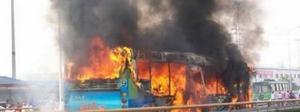Transportation securityBus bombing signals tough road ahead for Philippines
Al Qaeda-linked Muslim extremist group Abu Sayyaf is continuing its attacks in the Philippines; the latest attack, in Makati City, has killed five; last year, the same terrorist organization claimed responsibility for killing 116 people in a burning ferry in Manila Bay, the deadliest terrorist attack in the country’s history; lawmakers propose installing CCTVs on city buses

Bus bombing in the Philippines' Makati City // Source: pipvtr.com
Philippine president Benigno Aquino III has issued an award for information leading to the capture of those responsible for the recent bus bombing in Makati City that killed five. Having assumed office in June 2010, Aquino will not only be challenged with bringing stability to the country, but also with complex security problems concerning Muslim and communist rebellions as well as rampant gang violence.
A similar bombing on 14 February 2005 was called a “Valentine Gift” to President Gloria Macapagal Arroyo by the al Qaeda-linked Muslim extremist group Abu Sayyaf. Abu Solaiman, a leader of the group made a call to a local radio station shortly after and claimed that the three bombs that killed six and wounded 100 were a “continuing response to the Philippine government’s atrocities committed against Muslims everywhere.”
Last year, the same terrorist organization claimed responsibility for having killed 116 people in a burning ferry in Manila Bay, the deadliest terrorist attack in the country’s history.
On 25 January 2011, the Newman Goldline bus was at the north-bound load bay in Makati City, the financial capital of the Philippines, when an explosive device planted beneath a seat exploded.
Police Chief Superintendent Jose Arne delos Santos, head of the investigation, spoke with surviving passengers and the bus conductor and found that two men were asking whether the bus would be passing the area where the bomb was eventually detonated.
Investigators are working with sketches of the two men based on descriptions provided by the survivors.
Travels warnings issued last year by several countries places the security of the Philippines, as well as Aquino’s leadership into focus. The president has placed the reassessment of threats for the public transport system among his chief security concerns.
In a report by the Philippine publication Alto Broadcasting System-Chronicle Broadcasting Network (ABS-CBN), a lawmaker suggested the Land Transportation Franchising and Regulatory Board (LTFRB) push for the installation of closed-circuit TV (CCTV) video cameras in all passenger buses. ABS-CBN is also keeping close tabs on Aquino’s 10-point agenda with a “promises tracker.” Aquino’s government and justice agenda includes: crafting a judiciary modernization, plan, decongesting jails, and improving the conviction rates of prosecutors. Western Samar Rep. Mel Senen Sarmiento noted that the country’s public transport system involving buses and jeepneys is not designed to detect and counter possible strikes by terrorists and other criminal elements. “Our transport system allows bus and jeepney drivers to pick up passenger from any point of their route instead of pre-established terminals or pick-up stations which could allow our law enforcement units to establish security checks. This system might even help decongest traffic in Metro Manila,” he said. Presidential spokesman Edwin Lacierda again rallied the people behind the administration, saying it was trying its best to address all the problems of the country.
“We are asking the public to cooperate with us and to remain vigilant in an effort to secure the country. We need the cooperation of the public and this is not only an effort on the part of the government to assure the public that we are doing something,” he said.
